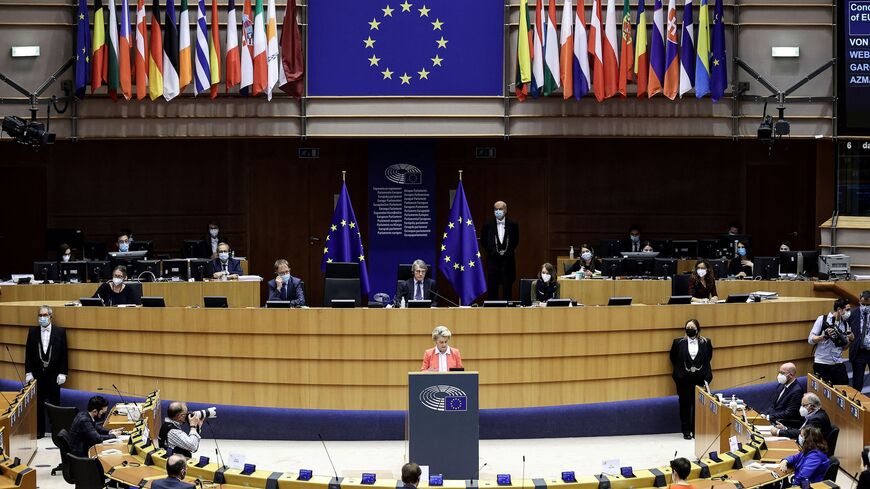Turkish President Recep Tayyip Erdogan’s attempt to trade Sweden’s NATO bid for Turkey’s European Union membership was rebuffed by the European Parliament (EP) Tuesday, with a new report underlining that the two processes were unrelated. The European deputies called on the EU to start a reflection process to find an “alternative and realistic framework” in substitution for Turkey’s EU accession process.
The EP report urged Turkey “to ratify Sweden’s NATO membership in the Turkish Grand National Assembly as early as possible,” saying that delaying it would only play into Russia’s hands. EP members acknowledged measures taken by the Turkish authorities to prevent the re-exportation to Russia of goods covered by EU sanctions, but it urged them to go further to ensure that Turkey “stops being a hub for entities and individuals that wish to circumvent such sanctions.”
A press release on Tuesday from the EP Foreign Affairs Committee said EP members underlined that the NATO accession process of one country cannot be linked to the EU accession process of another. A parliamentary source told Al-Monitor that this was a new amendment to the report, implying that the wording came after Erdogan made the linkage between Sweden’s NATO bid and Turkey’s long-standing bid for EU membership.
Today @EP_ForeignAff adopted the latest report on #Türkiye. For the 1st time 0 votes against. It shows great consensus at @Europarl_EN on what 🇹🇷 should do to revive 🇪🇺 accession process: it's not about geopolitical bargaining but reforms on #HumanRights! Final vote in September pic.twitter.com/2vkwyIYdIG
— Nacho Sánchez Amor (@NachoSAmor) July 18, 2023
“We have recently seen a renewed interest from the Turkish government in reviving the EU accession process. This will not happen as a result of geopolitical bargaining, but when Turkish authorities show real interest in stopping the continuous backsliding in fundamental freedoms and the rule of law,” the EP’s Turkey rapporteur, Nacho Sanchez Amor, said after his report was accepted 47 in favor, none against, and 10 abstentions in the EP Foreign Affairs Committee. It will come before the general assembly in the fall.
Sanchez Amor, a fiery Spanish democratic socialist, has been a vocal critic of the press statement made by Erdogan, Swedish Prime Minister Ulf Kristersson and NATO Secretary-General Jens Stoltenberg at the 11th hour at NATO’s Vilnius summit last week. Under the deal, Turkey promised to greenlight Sweden’s membership bid to NATO, and Sweden, an EU member, pledged to support Erdogan’s efforts to revive Turkey’s stalled accession. After Stoltenberg expressed his support for Turkey’s EU membership, Sanchez Amor responded with a scathing tweet, asking Stoltenberg whether he had been named EU enlargement commissioner.
Apparently #NATO Secretary General @jensstoltenberg seems to have been recently appointed #EU Commissionner for Enlargement, advocating for #Turkiye. Thanks for the unsolicited advice but EU's nature is completely different than NATO's (and rightly so).
— Nacho Sánchez Amor (@NachoSAmor) July 10, 2023
The EP report called Turkey “a country of strategic relevance in political, economic and foreign policy terms, a key partner for the stability of the wider region and a vital ally, including within NATO,” and reaffirmed the EU’s commitment to pursuing the best possible relations with its longest-standing candidate. It also urged the Turkish government, the EU and member states to “break the current deadlock,” and it called on the European Commission — the executive body of the 27-member bloc — to explore “possible formats for a mutually appealing framework.”
Though the reports of the EP — the only directly elected body of the EU — are of advisory value, they may foreshadow the general line that the Commission and the European Council — the decision-making body of the union that is made up of relevant ministers or heads of member states — would take. Sanchez Amor’s statement today is timed to air the deputies’ views before the EU foreign ministers take up ties with Turkey at a lunch discussion on June 20.
The foreign ministers’ meeting follows the request of the EU leaders two weeks ago for the European Commission and EU’s chief diplomat Josep Borrell to come up with a comprehensive report on the “state of play” of EU-Turkey relations “with a view to proceeding in a strategic and forward-looking manner.” Erdogan’s efforts to breathe life into the country’s EU bid in Vilnius were met with a noncommittal approach from key member states and top Eurocrats, who kept referring to the report expected to come out in October. Turkish Foreign Minister Hakan Fidan has met since then with Borrell at the sidelines of an ASEAN summit but made no statements.
A memo prepared by the EU’s diplomatic service ahead of the talks remains noncommittal. It underlines that Russia’s war against Ukraine “has raised Turkey’s geopolitical relevance.” It said that while recent policies have driven Turkey away from the EU, Turkey insists that EU accession is a strategic goal.
The memo also maintains that the EU has a strategic interest “in a stable and secure environment in the Eastern Mediterranean” — a reference to EU members Cyprus and Greece — and calls on the members to reflect on how the EU can “actively contribute” to the speedy resumption of Cyprus settlement talks. Nikos Christodoulides, the newish president of Cyprus who used to be a diplomat in the EU, is eager to get the EU involved in a settlement on the divided island. But Turkey and the Turkish Cypriots on the north of the island are reluctant to have the EU involved.
As EU foreign ministers discuss ties with Turkey, Erdogan will visit the Turkish Republic of Northern Cyprus where he will attend the ceremonies of Peace and Freedom Day, which marks the date Turkish armed forces landed on the north of the island in 1974 in the wake of a Greek junta-backed coup that aimed to unite the island with Greece. The island was split along ethnic lines, with the internationally recognized Republic of Cyprus in the south and the Turkish Republic of Northern Cyprus, recognized only by Turkey, in the north. Turkey’s nonrecognition of the Republic of Cyprus, which became an EU member in 2004, is one of the stumbling blocks to Turkish accession and the modernization of the Turkish-EU Customs Union, which Turkey wants.
“The EU accession talks will not come back because Turkey is unlikely to recognize the Republic of Cyprus, amend its anti-terror law or reinstate the rule of law quickly. The EU will not move until these three stumbling blocks are dealt with,” said Marc Pierini, a former EU envoy to Turkey and a senior fellow at Carnegie Europe.
Pierini suggested that inviting Fidan and Economy Minister Mehmet Simsek to Brussels for in-depth talks would be a good starting point to see what the EU offers and how Turkey would react.
Inviting #Turkey’s FM #Fidan at an #EU ‘Gymnich’ meeting would attract big media attention.
— Marc Pierini (@MarcPierini1) July 17, 2023
But an in-depth discussion between #Fidan & #Simsek and @VDombrovskis @JosepBorrellF @PaoloGentiloni @ThierryBreton would be a more discrete, more efficient method. https://t.co/iAeJFR5kjo
No accession without human rights
The EP report maintains that while they urge Turkey and the EU to break the current deadlock in ties, Turkey’s bid for membership cannot go further without Turkey taking serious steps to abide by EU laws, principles and obligations, particularly in respecting democratic values, the rule of law and human rights.
The report draws a dark picture of the democratic backsliding in Turkey, saying that “a relentless crackdown on any critical voice, particularly ahead of and during the recent elections,” continued throughout 2023. It also expresses concern about the “lack of independence of the judiciary” and “serious restrictions on fundamental freedoms,” citing constant attacks on the fundamental rights of members of the opposition, lawyers, journalists, academics and civil society activists, Kurdish politicians, journalists, lawyers and artists, and “the constant targeting and harassment of LGBTI+ people.”








